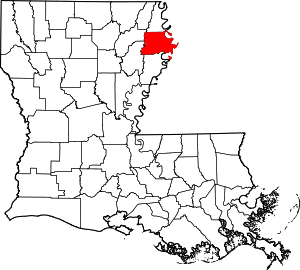





Please add profiles of those who were born, lived or died in Madison Parish, Louisiana.
Created in 1838, the parish is named for former U.S. President James Madison.
When Governor Thomas Overton Moore realized that New Orleans was going to fall to Union forces, he issued orders for the destruction of stored cotton in the state to keep it from Federal hands. Otherwise, the Union would sell the cotton, for which there was still high demand, and claim the revenue. The planters and brokers supervised slaves who burned hundreds of thousands of dollars worth of cotton in New Orleans and around the state. Governor Moore asked Brig. Gen. R. B. Todd, who commanded the Eleventh Brigade in northeast Louisiana, to call his own militia into active service, and all men between eighteen and forty who were not subject to conscription. These men from Madison, Carroll, and Tensas parishes were to cooperate with Confederate authorities to help repel Federal attacks in the area.
Toward the end of the war, Madison Parish faced problems with jayhawkers, men sympathetic to the Union. According to historian Winters, they "were holed up in the impenetrable cane and cypress swamps in the area. This band, made up of draft dodgers, deserters, and runaway Negroes, often left the swamps to rob, kill, or capture anyone who passed by on the road." The Confederates dressed in Federal uniforms to trick the jayhawkers. Winters continues: "The leader of the desperadoes, a huge black, welcomed the supposed Federal troops. Suddenly the [Confederate] disguised men fell upon the surprised gang and began to slaughter them. [In] a quick but bloody struggle [the Confederates] killed 130 of the group. The few who escaped never again returned to ravage the area."
Following the Reconstruction era and during the Jim Crow era, white Democrats across the state violently suppressed black voting, which was for Republican candidates, and civil rights. Twelve blacks were lynched in Madison Parish from 1877 to 1950, most near the turn of the 20th century when social and economic tensions were the highest. In addition, in July 1899 five immigrant Sicilian grocers were lynched by whites in Tallulah, the parish seat, for failing to observe Jim Crow customs of serving whites before blacks and because they were competing with locals with their stores.
The Sevier family, members of the Democratic Party, dominated Madison Parish politics for more than a century, during a period when most blacks (who were voting Republican) were disenfranchised after passage of the 1898 constitution. It raised barriers to voter registration. These planters claimed descent from John Sevier, a fighter in the American Revolution, governor of Tennessee, and namesake of Sevierville and Sevier County in eastern Tennessee. Among the political Seviers were Andrew Jackson Sevier, Jr., who served as sheriff of Madison Parish from 1904 until his death in 1941. He was briefly succeeded by his wife, Mary Louise Day Sevier. Louisiana State Senator Andrew L. Sevier served from 1932 until his death in 1962. State Representative Henry Clay "Happy" Sevier, Sr. served from 1936 to 1952. William Putnam "Buck" Sevier, Jr., was a banker and town alderman. He served as mayor of Tallulah from 1947 until his retirement in 1974.
Tensas River National Wildlife Refuge (part)
Vicksburg National Military Park (part)
LA Genealogy & History Network
